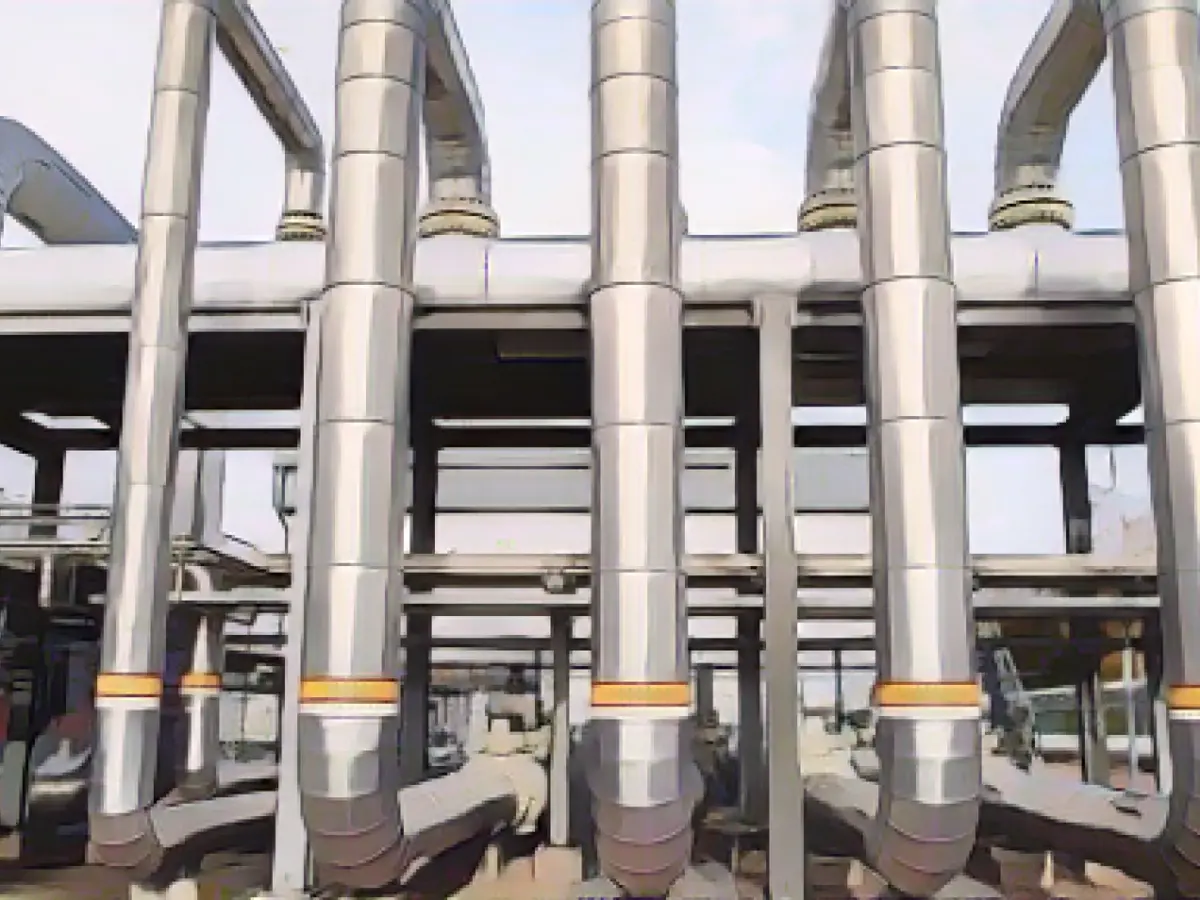Network Agency - Gas storage facilities 90.8 percent full: "Well equipped"
Germany is starting the new year with plenty of natural gas in storage. The total fill level on Thursday morning was 90.8%, according to data from the European Gas Storage Association GIE. Exactly one year earlier, it had been 88.8 percent.
To put this into perspective: when storage facilities are full, the amount of gas stored corresponds to the consumption of two to three average cold winter months. A filling level of 100 percent was recorded on the morning of November 5.
The largest German storage facility in Rehden, Lower Saxony, was 81.2 percent full on Thursday morning. The storage facilities across the EU are also still fairly full. According to GIE, the filling level was 87.0 percent.
Gas storage facilities compensate for fluctuations in gas consumption and thus form a buffer system for the gas market. Filling levels usually decrease in winter and increase again after the end of the heating period. In recent weeks, unlike usual, there were several days on which on balance more was injected than withdrawn, i.e. the filling levels increased.
Mild temperatures in November and December
According to storage association Ines, the current filling level is "well above average". "The mild temperatures in November and December resulted in relatively low consumption and thus prevented a greater depletion of gas storage facilities," Sebastian Heinermann, Managing Director of the industry association Initiative Energien Speichern (Ines), told dpa.
The President of the Federal Network Agency, Klaus Müller, expressed his satisfaction. "People have saved a lot of gas this year. That has given us a good cushion for the winter," he told dpa. "The storage facilities are still very well filled. We are well equipped for the second half of winter." A few cold days were no cause for concern. "At the beginning of December, however, we could see how much gas consumption increases as soon as it gets colder." Stable imports are therefore important for securing the gas supply.
It should be noted that in addition to withdrawals from storage facilities, gas continues to flow into Germany on a permanent basis, primarily through pipeline imports. According to the Federal Network Agency, most of the gas on Wednesday came from Norway, the Netherlands and Belgium. Gas also flowed into the German gas grid via the new LNG terminals on the German coasts. Germany also purchased natural gas from Switzerland and Denmark.
Association: Gas should be sufficient even in extremely cold weather
The industry association Ines is also confident that the gas supply will be secure this winter. "In the meantime, the gas supply should be fully guaranteed even in extremely cold temperatures," said Heinermann. "If no unforeseen risks arise, we will get through the rest of the winter safely."
Müller said he was grateful that many people were using gas more consciously. It is worth thinking carefully about what consumption can be saved. "Every kilowatt hour saved also makes a real difference to the household budget," he emphasized.
Fewer and fewer consumers are resolving to save energy
However, saving energy as a New Year's resolution is much less popular in households this year than in 2022, according to surveys conducted by the opinion research institute Yougov for the energy service provider Ista. While around 43% of Germans resolved to use less energy at home around a year ago during the energy crisis, only 29% will do so in 2023, as Ista reported on Friday.
According to the data, six percent of Germans are now planning to consume much less energy. Twenty-three percent want to reduce their energy consumption slightly. 36% of Germans do not want to change their consumption behavior and believe they are already on the right track. Five percent want to heat more. 26 percent said they would not be making any New Year's resolutions. The rest did not say.
Natural gas wholesale price falls sharply
Meanwhile, the wholesale price of natural gas in Europe fell to its lowest level for three months shortly before the end of the year. On Friday, the benchmark TTF futures contract for delivery in a month's time cost 31.99 euros per megawatt hour on the Amsterdam exchange. European natural gas has not been this cheap since September. At the beginning of 2023, a megawatt hour was still trading at 79 euros.
Read also:
- Why there is still no EU funding for green Saar steel
- 3 billion Saar Fund is unconstitutional
- Lack of snow also opens up new opportunities for winter tourism
- Abrupt end to e-car subsidies
- The fill level of Germany's largest gas storage facility in Rehden was 81.2% on Thursday, according to the data.
- Klaus Müller, the President of the Federal Network Agency in Germany, expressed his satisfaction with the high fill level, stating that people had saved a lot of gas this year.
- Ines, a European gas storage association, considered the current fill level to be "well above average," attributing it to the mild temperatures in November and December, which resulted in lower gas consumption.
- The EU's gas storage facilities also had a high filling level of 87.0%, according to GIE.
- According to Müller, stable imports from Norway, the Netherlands, Belgium, Switzerland, and Denmark are crucial for securing the gas supply during the winter.
- Klaus Müller emphasized that every kilowatt hour saved makes a real difference to the household budget.
- Despite the high fill level, fewer and fewer consumers are resolving to save energy in 2023, with only 29% planning to reduce energy consumption, according to surveys conducted by the energy service provider Ista.
Source: www.stern.de








